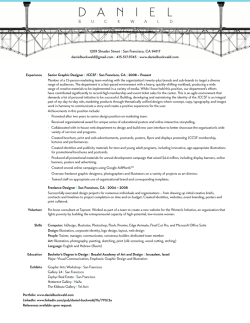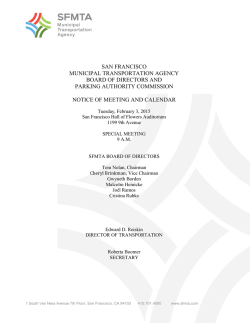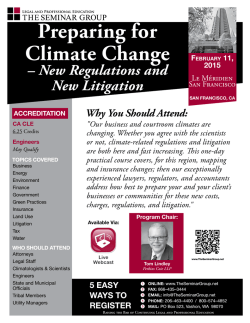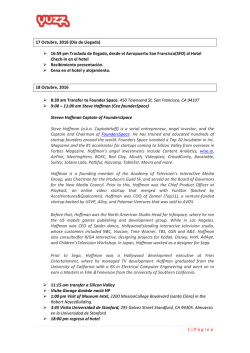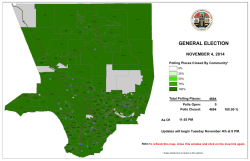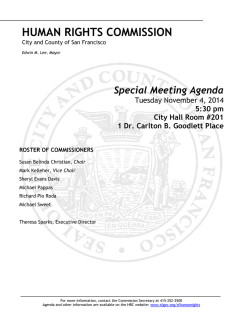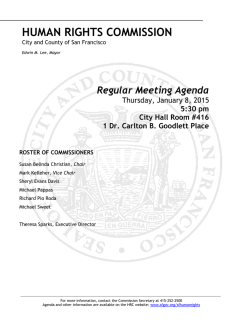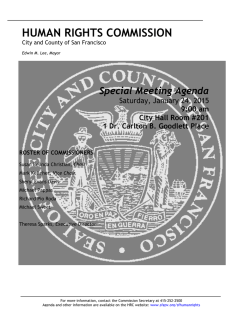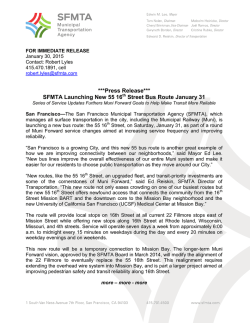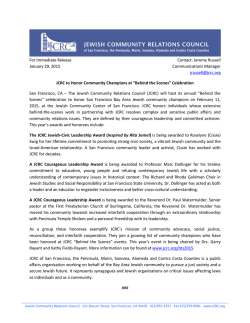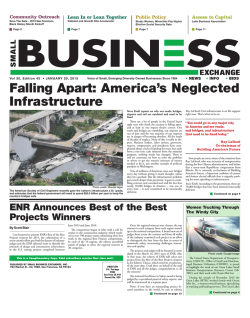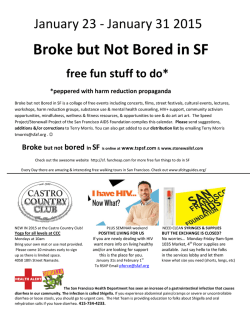
MARIA BLANCO - UC Davis School of Law
MARÍA BLANCO 221 S. Figueroa St., Suite 400 Los Angeles, CA 90012 213-452-6223 [email protected] EDUCATION JD, University of California, Berkeley BA, University of California, Berkeley BAR ADMISSION 1991, United States Supreme Court 1984, State Bar of California 1984, United States Court of Appeals (9th Circuit) 1984, United States District Court (Northern District) 1987, United States District Court (Eastern District) 2003, United States District Court (Central District) EMPLOYMENT California Community Foundation, Los Angeles, CA (2010 – Present) Vice President, Civic Engagement The California Community Foundation (CCF) is the community foundation for Los Angeles County. Its mission is to improve the life of Angelinos, particularly the most vulnerable, through grants, collaboratives and civic engagement efforts that bring together the non-profit, public, private and philanthropic sectors to solve pressing issues. With a staff of 62 and $1.2 billion in assets, CCF is nearing its centennial. • Member of eight-person leadership team responsible for stewardship of CCF’s donor advised funds, the annual and long term budget, allocation of discretionary and field of interest grants, special initiatives, and CCF’s community engagement work. • Manage three Program Officers and a Program Associate whose grant dockets include Immigrant Integration, an Early Childhood Education Initiative, American Muslim Civic Engagement and variety of Resident Civic Engagement grants. The Civic Engagement department granted $4 million in grants during fiscal year 2012-2013. • Responsible for the Foundation’s core civic engagement mission of bringing together the public, private and non-profit sectors to jointly facilitate solutions to pressing problems in the County. Accomplishments Creation of Citizenship Corners in all 72 public libraries in the City of Los Angeles through CCF’s citizenship collaborative which is jointly funded by local, state and national foundation partners. This library outreach model has become a national model. 1 Creation, with local input and CCF funding, of a civic engagement academy in an large but isolated area of the county that has seen numerous instances of political corruption and resident disenfranchisement. The academy’s 52 Spanish-speaking participants are entering part two of a 30-week course that will culminate in real time civic engagement activities, including policy advocacy. Launch of a 3-year, $1 million America Muslim civic engagement initiative in Los Angeles County, with a matching grant from a national family foundation. As a member of California’s Citizens Redistricting Commission, drew the 2011 lines for California’s legislative and Congressional Districts. Earl Warren Institute on Law and Social Policy, University of California, Berkeley, School of Law, (2007 – 2010) Executive Director, Resident Lecturer The Warren Institute’s mission is to engage the most difficult topics in a wide range of legal and public policy subject areas, providing research and expertise for public and private sector leaders, the media and the general public. The Warren Institute is funded principally by project-specific foundation grants and donations from alumni of Berkeley School of Law. Between 2007 – 2010, the Institute’s areas of focus were education equity, impact of immigration enforcement by local law enforcement agencies on local communities, and voter engagement. • • • Designed research projects together with the Institute’s two faculty codirectors (Justice Goodwin Liu and Dean Christopher Edley), and with the input of policymakers, policy advocates and research faculty at UC and other universities. Oversight and responsibility for development efforts. Raising money for research projects was the joint responsibility of the director, research staff, development director, and faculty co-directors. Supervision of 4 research staff (2 part-time), 1 development director and 3 support staff. Supervision of research staff included joint design of research projects, ensuring that proposed research was relevant to policy work in our core areas, and securing funding for the research. In addition, research supervision entailed making sure relationships with research faculty throughout UC Berkeley and the UC system were cultivated and carefully maintained. Finally, as Director I reviewed every report we produced for content, methodology and presentation. Accomplishments Multi-year, multi-million grant to produce research white papers on bedrock education topics to be presented by experts at quarterly roundtables held in Washington DC and attended by national organizations dedicated to improving educational outcomes for underrepresented communities. 2 Production of a series of white papers on the economic and human rights impact of discriminatory immigration enforcement conducted by local law enforcement agencies. Lawyers’ Committee for Civil Rights of the San Francisco Bay Area, San Francisco, CA (2003 -2007) Executive Director The Lawyers’ Committee, or LCCR as it is known locally, is a non-profit, public interest law firm established in 1967. LCCR provides direct legal services through a weekly legal clinic staffed by pro bono attorneys from major Bay Area law firms. The clinic is a major source of pro bono work for many new and long time attorneys in the Bay Area. LCCR’s direct services are widely known for their asylum and refugee work that has resulted in national precedent setting legal decisions. In addition, LCCR brings impact lawsuits in the areas of education equity, immigrant rights, employment discrimination and voting rights. With experienced in-house lawyers, the model at LCCR is to co-counsel all its cases with major local law firms. With this model LCCR is able to benefit from the resources of community minded law firms and also establish a financial support from lawyers and law firms. • Managed a staff of 6 lawyers, 3 paralegals, 4 fellows, development director, office manager, accountant and 4 support staff with a yearly budget of $7 million. Reviewed and gave final approval for recommended litigation and settlements. Participated in the internal litigation committee that set longterm legal strategy and oversaw existing litigation. Responsible for fund raising through an annual event, foundation grants, individual donor campaigns, annual board giving campaigns and securing and management of attorney fees. • Worked with a 14-member Board of Directors whose members came primarily from large established law firms, and some mid-sized and nonprofit law firms. Provided guidance to the Board’s finance and membership committees. The LCCR board meets quarterly and the finance committee met on a monthly basis. ACCOMPLISHMENTS LCCR had a $400,000 deficit and a systemic weekly cash flow problem when I was hired. When I left 3+ years later, LCCR had a 6-month reserve and an endowment. This was the result of cost cutting, increased individual donations, new national foundation grants, and a novel strategy of having law firms contribute settlement monies to LCCR. In 1 year, we had over $900,000 in firm donations. For the first time LCCR received multiple national grants. With the help of the Board, the community and consultants, reestablished LCCR’s work in the African-American community, which was at the heart of it founding. 3 Mexican American Legal Defense and Educational Fund, San Francisco, CA, Sacramento, CA and Atlanta, GA (1998-2003) Regional and National Senior Counsel MALDEF, the Mexican American Legal Defense and Educational Fund, is the country’s oldest and largest legal civil rights organization dedicated to legal work on behalf of the nation’s Latino community. It has offices in DC, Chicago, San Antonio, Atlanta, Los Angeles and Sacramento. • • Managed Regional Offices in San Francisco and Sacramento. The San Francisco office had 6 full-time staff, yearly interns and fellows, and a regional budget of $3 million. Responsibilities included producing an annual dinner, supervision of all litigation and of the regional census outreach program in 2000. In addition, I maintained my own litigation caseload. I also supervised MALDEF’s legislative office of 4 in Sacramento. This included deciding which legislation to sponsor and support, and supervision of the staff’s work to build support for legislation, often accompanying them on legislative visits. When MALDEF’s San Francisco office was closed in order to open the new Atlanta office, I was tasked with opening the Atlanta office. I also supervised the organization’s national employment litigation and policy work across regional offices and worked with the DC office on immigration policy. ACCOMPLISHMENTS Opened MALDEF’s Southeast office in Atlanta, GA to address the legal and civic needs of the new and growing Latino population. First new MALDEF office in 12 years. In 2001, worked successful to pass bi-partisan legislation in Sacramento that opened the doors of higher education to undocumented students, now known as Dreamers. Women's Employment Rights Clinic, Golden Gate University School of Law, San Francisco CA (1994 – 1998) Associate Director and Associate Professor of Law This Clinic is a self sustaining department of Golden Gate Law School that provides 4 law students with hands-on clinical education that prepares them for a successful job search and career. • Taught and supervised law students who handled wage and hour cases, and unemployment appeals in an administrative setting. Also created opportunities for students to participate in larger court cases where the clinic worked with external law firms. ACCOMPLISHMENTS Established a line of support for the clinic by adding a line of cases that brought a steady flow of attorney fees to the Clinic. This enabled the Clinic to pay for its overhead, thus ensuring GGU faculty support for the program. Equal Rights Advocates, San Francisco CA, (1987-1994) Staff Attorney Founded in the early 70’s, Equal Rights Advocates is a public interest law firm that specializes in legal and policy advocacy on behalf of women and girls. It is one of a handful of remaining organizations dedicated to legal advocacy on issues affecting women and girls. • Handled numerous federal class action and individual cases involving pay and pregnancy discrimination, and sexual harassment. Participated in local and national policy work on issues related to gender discrimination and immigrant women. ACCOMPLISHMENTS Represented the women who integrated the San Francisco Fire Department. This was a complex and controversial case that lasted many years, as did the monitoring of the consent decree eventually approved by the federal court. Drafted the pregnancy policy for the department, one of the first in the country. Litigated the first peer sexual harassment case in the country (involved bullying of a middle school student in Santa Rosa) jointly with a New York public interest la firm. Litigated a case of first impression that established that undocumented workers were covered by Title VII anti-discrimination laws. Our client was an undocumented employee fired because she was pregnant. Staff Attorney, United States Court of Appeals (9th Circuit), San Francisco, CA SERVICE Commissioner, California Citizens Redistricting Commission Board of Directors, Public Policy Institute of California 5 Board of Directors, Insight Center, Oakland, CA Board of Directors, Homeland Productions, National News Production Co. PRIOR SERVICE 2008-2009 Presidential Transition Team, Education Board of Directors, La Raza Centro Legal, San Francisco, CA Board of Directors, Clinica de la Raza, Oakland, CA Co-chair, California Coalition for Civil Rights Board of Directors California Rural Legal Assistance REPRESENTATIVE CASES Castrejon v. Tortilleria La Mejor 758 F.Supp 585 (E.D. Cal. 1991) Established that undocumented workers were covered by Title VII and federal labor laws. Davis v. City and County of San Francisco 890 F.2d 1438 (9th Cir. 1989) Successful challenge to the SF Fire Department's physical and written entrance examinations on the basis of race and sex, ongoing enforcement of innovative consent decree. Pallas v. Pacific Bell 940 F.2d 1324 (9th Cir. 1991), cert. denied ____ U.S. ___, 112 S.Ct. 916 (1992) Case of first impression challenging defendant's policy of excluding pre-1979 pregnancy disability leaves from accrual of retirement benefits. Doe v. Petaluma 54 F.3d 1447 (9th Cir. 1995) Case of first impression. Title IX lawsuit on behalf of junior high school student who alleged that unremedied peer sexual harassment violated her right to an education free of discrimination. Alvarado et al. v. Sprint Case of first impression in California. Lawsuit on behalf of Sprint, La Conexion Familiar, employees who were terminated without 60 days notice required by federal plant closure law (WARN). Cuadra et al. v. Millan (1998) 7 Cal. 4th 855 California Supreme Court upheld writ of mandamus striking down the Labor Commissioner’s policy of refusing to toll the statute of limitations when workers file administrative claims for back wages with the office of the Labor Commissioner. 6 Castañeda v. UC Regents Challenge to UC Berkeley’s admissions policy as discriminatory policy towards Latinos, Filipino-Americans, and African-Americans in violation of federal Title VI law. AWARDS Social Justice Hero Award – Centro Legal de Oakland, 2009 Ohtli Award from Mexico State Department and Institute of Mexicans Abroad, 2 008 Community Leadership Award – Anti-Defamation League, 2006 Most Influential Bay Area Latinos – San Francisco Hispanic Chamber of Commerce, 2006 Clay Award Recipient, California Lawyer of the Year, 2004 Women Who Could Be President, League of Women Voters, 2003 Recipient, Mensches in the Trenches Award, American Jewish Congress, 2000 Recipient, San Francisco La Raza Lawyers Association Unity Award, 1995 Recipient, MALDEF Legal Services Award, 1991 Recipient, NAACP Legal Defense and Educational Fund Award, 1988 7
© Copyright 2026
